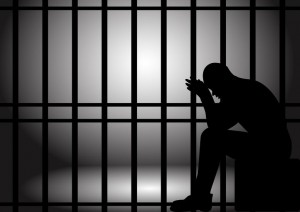Why Every Humanist Should Care about Criminal Justice Reform

People identify as humanists because they care about remediating societal ills and helping humanity to progress. Choosing to live as rationally and compassionately as we can while rejecting the supernatural as a form of truth is just a given.
This ethic of care means that as humanists we ought to address the US criminal justice system, which, much like climate change, though for different reasons, is a bleak issue that we often avoid engaging with because so many of us aren’t directly affected by it. Why would we engage when these conversations can be painful, can illuminate truths we don’t want to swallow, and can be disagreeable? It’s easier to look away than it is to try and dismantle systems built on decades of racism.
The criminal justice system has long been the opposite of just. Ava DuVernay’s Netflix documentary 13TH, released earlier this month, details how prisons became the form of mass control we see today by using vagrancy laws to criminalize Blacks and inscribe them in a system of convict labor. The film explores how the Thirteenth Amendment banned slavery “except as a punishment for crime whereof the party shall have been duly convicted;” how class and race are criminalized through the dog-whistle politics of “tough on crime” rhetoric; how the naissance of the prison-industrial complex is fueled by corporate interest and government relationships; and how the militarization of the police force creates abusive power dynamics between the community and its supposed stewards.
HBO’s John Oliver has shown us time and again that the criminal justice system is particularly hard on the poor (mandatory minimums, prison, prisoner re-entry, bail, public defenders, municipal violations, civil forfeiture, death penalty), confirming that innocence and guilt are irrelevant components of the process. As Deputy Attorney General Sally Yates said at a Brookings’ Hamilton Project event I attended this week on re-entry programs for formerly incarcerated individuals, “We shouldn’t have two systems of criminal justice for different socioeconomic classes.”
In addition to disproportionately affecting Blacks and other minority communities of color as well as low-income populations, our criminal justice system also routinely conflates substance abuse and mental illness with criminality, prioritizing investment in mass incarceration over community-based public health education and treatment initiatives. When we think of the hardships of prison (from solitary confinement to lack of proper nutrition and education resources to abuses by correctional officers), we generally tend to picture them as affecting men. However, women and transgender individuals also face their own unique sets of problems, such as human rights abuses that can include sexual assault and abuse stemming from transphobia.
By no means do these challenges end after incarceration, in a system that not only doesn’t adequately prepare formerly incarcerated individuals for re-entry but in fact places many legal barriers to full citizenship, social assistance programs, and job certification. Added to these barriers are the often insurmountable parole requirements and the enormous stigma of being an “ex-con,” “ex-offender,” “felon,” or “criminal,” which bars employment and thus economic opportunity.
Recently, the Department of Justice has made strides in ending federal use of private prisons, and it continues to move towards more stringent requirements for privately run government programs (like halfway houses). Investment in rehabilitative approaches and a reduction in the use of solitary confinement in the federal system are also encouraging. However, this progress should not be taken for granted. This summer, I outlined three keys to ending federal private prisons: expand reform to state institutions of mass incarceration, decouple profit from imprisonment, and design with rehabilitation and healing as an end-goal for all stakeholders.
The invisibility of criminal justice for so many of us allows us to not care. It allows mainstream narratives about how violent criminals “deserve” to be locked up to drive a punitive instead of rehabilitative approach. It also allows lawmakers to come up with arbitrary sentencing policies that permit rapists to serve little to no time at all, which perpetuates rape culture, while also mandating inordinately long sentences for minor offenses. It is undeniably alarming when lawyer, activist, and founder of Equal Justice Initiative Bryan Stevenson makes a case for a client by saying “Motion to try my poor, fourteen-year-old Black, male client like a privileged, white seventy-five-year-old corporate executive,” and we all know what he means.
This information is not meant to be easy to digest—especially if you don’t identify as part of a community that’s especially affected by the school-to-prison pipeline. Or you have no direct experience with the system. Or when you’ve been harmed by unethical acts against your personhood or your property. Or when you hear about serial killers, atrocious violent acts, and other injuries to humanity that convince you they deserve punishment—and perhaps even retaliation.
Yet because we value critical thinking over one-sided arguments and shallow thinking, I am confident we are capable of seeing prisoners and formerly incarcerated individuals as complex, whole beings beyond their criminal records who are capable of change or at least, deserving of basic human rights.
